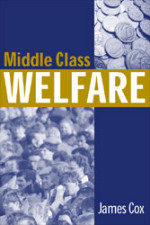By comparison with some other countries, New Zealand relies heavily on education and health services and retirement income support provided by governments and financed through taxation. Much government education and health expenditure benefits families with moderate to high current incomes. Much expenditure on superannuation benefits individuals and couples who earned moderate to high incomes during their working lives. Such 'churning' of income and the high taxation associated with it does nothing for equity, is economically wasteful and damages economic growth.
In Middle Class Welfare, James Cox documents the level of income churning in New Zealand and argues that governments should consider alternative policies that involve people who can afford to do so taking greater responsibility for providing their own health care, education and retirement incomes. Such policies would result in improved service quality and reduce the burden of financing the welfare state that falls particularly heavily on families with children.
Although there are many issues that need to be considered in designing policies, alternative approaches operate successfully in overseas countries, including Australia. Middle Class Welfare analyses such options and advances positive proposals for reform of the New Zealand welfare state that would better allocate public assistance and allow taxes to be reduced.
James Cox is Chief Executive of the Independent Pricing and Regulatory Tribunal of New South Wales. He was an advisor to the New Zealand government on social policy changes in 1991.



